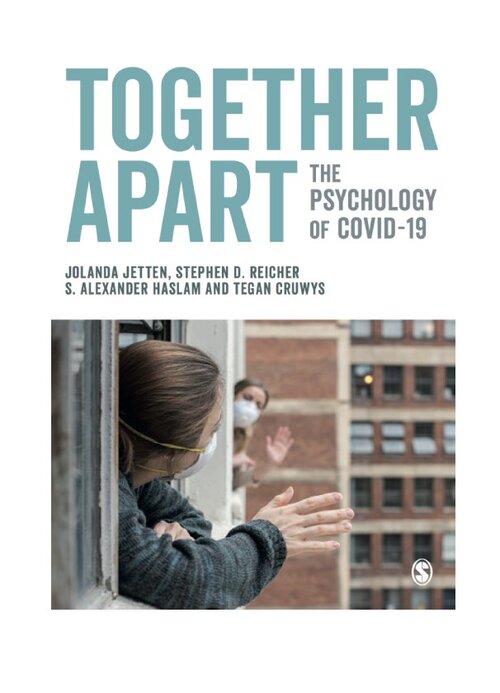
By Jolanda Jetten (University of Queensland), Stephen D. Reicher (University of St Andrews), S. Alexander Haslam (University of Queensland), and Tegan Cruwys (University of Queensland)
The idea that led us to write the book titled Together Apart: The Psychology of COVID-19 was a very simple one. We reasoned that while waiting for an effective vaccine or a medical treatment for COVID-19, all we can do to stop the spread of the virus is to change our behavior. And what is more, because of the contagious nature of COVID-19, it is not just “my” behavior, it is the behavior of all of “us”— of all the groups that we belong to, of all our communities, and of society at large —that needs to change so that we can effectively control the COVID-19 spread.
In that sense, it is clear that the challenge that the COVID-19 outbreak poses is both huge and rather unique. It is unique in that, up until now, as social scientists, we have mostly focused on ways in which we can change individuals’ health behaviors. For instance, when a smoker wants to quit smoking, it is them as an individual we target because it is the individual who has to stop smoking. Likewise, when an individual wants to improve their physical fitness, we have to consider ways in which we can motivate them as an individual to, for example, join a gym. Even though the social environment that such individuals find themselves in is of crucial importance to facilitate such behavior change, it is ultimately an individual choice whether they quit undesirable habits and improve their physical health.
COVID-19 is different. Given the contagious nature of COVID-19, whether an individual will become infected is determined not only by their own health behaviors (whether they engage in physical distancing, wash their hands more frequently, wear a mask, etc.), but also by the behaviors of everyone physically close to them. This makes COVID-19 quite different from other health challenges. Consequently, tackling COVID-19 requires another type of public health campaign. More specifically, getting the virus under control requires coordinated collective level action. It requires everyone to engage in physical distancing, everyone to wash their hands more frequently, and (in some areas) everyone to wear a mask. If there is no collective level compliance with these recommended health behaviors, it is not just individuals, but all of us (i.e., the collective) who will be exposed to the virus. In other words, the spread of COVID-19 can only be stopped effectively when, as New York’s Governor, Andrew Cuomo put it, we accept that “It's not about me, it's about we.”
It was this insight that was the starting point for our book. From this, it follows that to understand how to achieve collective level compliance, we need a psychology that helps us to understand the unique collective dimensions of human behavior. This requires an understanding of people as group members, rather than as individuals. It requires knowledge of how to manage, lead, and coordinate people as members of the groups and collectives that they belong to. Take for example the discussion on mask wearing. Even though mask wearing is something an individual has to do, it is going to be most effective if everyone wears a mask in public spaces—if it is seen as something that “we” must do. That is exactly where the challenge arises. Collective level processes and dynamics relating to the effectiveness of leadership, the way that the media frames mask wearing, political polarization, societal solidarity, and social unrest, determine whether people wear a mask (because we agree it is “the right thing to do”) or resist it (because it is “something that they want me to do” or because it is seen as “infringement of my civil liberties”).
This makes clear that effective responses to COVID-19 demands knowledge how to build a sense of “we-ness” so that we unlock the power of the group to come together in solidarity to counter the threat that COVID-19 poses. If all of that is done effectively, the virus doesn’t stand a chance. But if this is done poorly, the virus has free reign.
In our book, we argue that it is only by understanding both individual-level and collective-level determinants of effectively stopping the spread of COVID-19, and by developing and translating those insights into tangible behavior change interventions, that we stand a chance to control the most significant world event of our lifetimes. Too much is at stake to not get this right.
Together Apart: The Psychology of COVID-19 is available to download for free here.